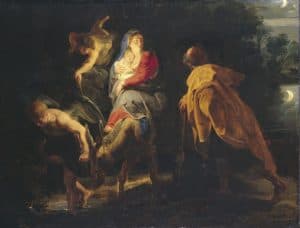The prophet Hosea was God’s spokesman in the waning decades of Israel, the Northern Kingdom. Primarily, he prophesied from around 750 to 722 B.C. In Hosea 11:1-2, the prophet recorded these inspired words from the Lord. “When Israel was a child, I loved him, and out of Egypt I called My son. The more they called them, the more they departed from Me. They kept sacrificing to the Baals and burning offerings to idols.”
Clearly this description reminded Hosea’s audience of the love God had for His people when He used Moses to rescue them from slavery in Egypt, as well as the clear tendency of the Hebrews to stray away from the Lord and worship false gods. Yet the phrase “out of Egypt I called My son”—just three words in Hebrew—carried a special significance that would not be unveiled until centuries later. In Matthew’s account of the flight to Egypt Mary, Joseph, and Jesus took when Jesus was a young child, Hosea’s words echo down through the years. The wise men had just left Bethlehem after visiting and worshiping Jesus. They had been directed in a dream to bypass Jerusalem and Herod, the evil king who had set his sights on killing Jesus. An angel of God appeared to Joseph in a dream and told him quickly to flee to Egypt until he received further instructions. The angel explained, “Herod is about to search for the child to destroy Him” (Matt. 2:13). Joseph obeyed. He remained in Egypt with his family until Herod was dead, “so that what was spoken by the Lord through the prophet might be fulfilled: ‘Out of Egypt I called my Son’” (v. 15). The prophet Matthew was writing about was, of course, Hosea.

While conventional wisdom would readily assign Hosea’s words historical but not prophetic (future) significance, Matthew’s account underscores that Hosea indeed was recording a future Messianic prophecy. This is an important reminder to us that God always knows “the end from the beginning” (Isa. 46:10) and has the “big picture” in mind. We also see this in the Passover, in which God foreshadowed the eternal deliverance that His Son’s death on the cross would make possible. We see it in the exodus as well, as Moses was used of God to deliver His people from the cruelty of Egyptian slavery, which represents the spiritual bondage of sin. Moses thus foreshadowed Christ and the exodus the eternal deliverance Christ would provide on the cross.
We are thus reminded that we must never read any biblical account as an isolated story. Rather, all biblical accounts are part of God’s big, unfolding story. Always look for how the biblical events you’re reading about fit into God’s overall plan.
Copyright © 2017 by B. Nathaniel Sullivan. All rights reserved.
Unless otherwise noted, all Scripture quotations in this article have been taken from the Holman Christian Standard Bible®, Copyright © 1999, 2000, 2002, 2003, 2009 by Holman Bible Publishers. Used by permission. Holman Christian Standard Bible®, Holman CSB®, and HCSB® are federally registered trademarks of Holman Bible Publishers.